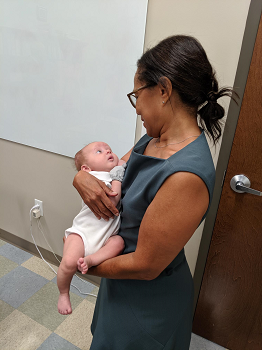News & Updates — President’s Update
Over the past few months, my colleagues and I have visited several states that have been hard hit by the opioid epidemic — among them Maine, North Carolina, Ohio, and Pennsylvania — so we could hear from those developing innovative solutions. We learned a lot and wanted to share some of our insights.
We can leverage the strengths of people with lived experience.
In Maine, where I attended Governor Janet Mills’ Opioid Response Summit, I saw how important it is to engage people directly affected by the opioid epidemic. Each session was launched by a person in recovery or a family member. One of the most memorable sessions was led by a young man who spoke about the obstacles he overcame to find treatment—not just for his addiction, but also for other serious health problems. His story illustrates the value of models that integrate primary care, behavioral health care, and addiction treatment. Understanding patient experiences is essential to refining our treatment approaches and tailoring services to the needs of different groups.
Those who have successfully navigated treatment for opioid use disorder (OUD) can also engage others. In Ohio, we met peer recovery coaches at Ohio State University’s (OSU) Wexner Medical Center. The coaches forge relationships with people arriving in the ED after an overdose in an attempt to engage them in treatment. This itself is a sign of progress: ED physicians told us a year ago they mostly revived people from overdoses; with the spread of naloxone, physicians are now more likely to see people who’ve already been revived and may be ready for longer-term help. Peer coaches are key to establishing trust, OSU’s physicians and nurses told us, because their lived experience demonstrates recovery is possible, even if people aren’t yet ready to accept help.
We must take a holistic approach to OUD treatment.
We also observed two programs for pregnant women coping with OUD. OSU’s medical center hosts a comprehensive program for pregnant women with OUD. In addition to taking part in group prenatal sessions, women receive medication-based treatment (MBT) and counseling from a team that includes a maternal/fetal medicine specialist, an addiction medicine fellow, and peer recovery coaches.
The Horizons program at the University of North Carolina (UNC) offers a similarly holistic package. The residential and outpatient program for pregnant women offers prenatal care, MBT, counseling, and supportive services. Some women stay for as long as a year, receiving well-child care as well as job and parenting training.
Programs that offer holistic treatment and wraparound supports help women deliver healthy babies and rebuild their lives. Horizons also provides a model for other health care programs on how to leverage diverse funding streams to support women for up to a year.

We need to support people during vulnerable transitions.
Our visits demonstrated how important it is to offer support over time — especially during moments when people may be most vulnerable. At OSU’s medical center, leaders try to connect women with other sources of treatment after the six-week postpartum period, but they worry they will struggle without having integrated medical, behavioral health, and social supports.
At the University of Pittsburgh Medical Center (UPMC) and elsewhere, teams are working to create strong guardrails to steer people from the ED to ongoing treatment. UPMC’s addiction consults team comes to the ED to assess overdose patients and recommend treatment plans.
Thank you to our hosts who so generously shared their experiences. We need to learn from organizations like these about how best to support people making transitions from one treatment setting to another, or through different stages of recovery.
In future President’s Updates, I’ll share lessons from our upcoming visits to West Virginia and other states.
(Picture: FORE president Karen A. Scott, M.D., M.P.H., meets the thriving two-month-old son of a Horizons participant, who is benefiting from the program’s array of addiction treatment and social supports.)